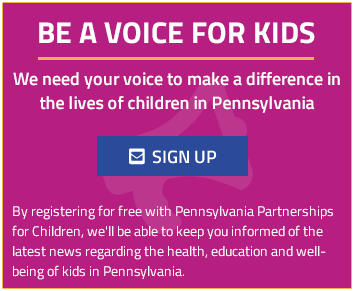The system leaves foster care youth behind. A West Virginia nonprofit wants to change that.
Statewide data from Pennsylvania Partnerships for Children paints a clear yet troubling picture. Among young adults with foster care experience in 2021, nearly a quarter did not have stable housing, almost half did not have part-time or full-time employment and only 25% had post-secondary enrollment. Independent living services, such as vocational training, tuition aid and housing vouchers, […]
PA Early Intervention programs vital for child development
A new study highlights the importance of Pennsylvania’s Early Intervention program and its services for infants and toddlers at risk of developmental delays. Kari King, president and CEO of Pennsylvania Partnerships for Children, said there are two Early Intervention programs: “Part B” for preschoolers, ages 3 to 5, and her group advocates for “Part C,” which supports […]












PAP4Children Follow 9,838 2,614
Pennsylvania Partnerships for Children is dedicated to improving the well-being of PA's 2.6 million kids. We're independent, non-partisan and non-profit.
We're back with #FastFactFriday! This week's focus: K-12 Education!
Our President and CEO, Kari King, sat down with Terry Madonna on @PANewsmakers to discuss Early Intervention in PA. Learn more about EI from our latest fact sheet - https://ow.ly/8EcP50RuWc8
May is National #FosterCareMonth! This year’s theme will raise awareness about authentic youth engagement, the importance of life-long connections, and how to best support youth as they transition out of foster care. https://ow.ly/W77q50Rtxuo
Time to make sure you're in the loop! 🕵️ Follow us and sign up for our #ppcnewsletter to gain first access to the latest news like this from our last edition🤩 https://ow.ly/80hv50RstZA . #SubscribeNow #TuesdayVibe